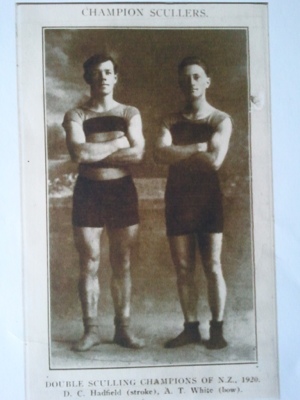Sculls
Last week I finally got to try out what the Dutch call a “skiff”: the long and narrow boat, lightly constructed and very unstable, used for competitive sculling.1 To my very great surprise, I managed to stay dry! (The biggest difference between a skiff and the C1 that I’ve been rowing for the past few months is that the hull of the C1 is itself stable in the water; in the skiff, on the other hand, you need to actively balance, either with your body or by resting the oars on the surface of the water.)
I’m going to take a skiff course when we get back from Greece, fulfilling a promise that I’ve been nursing for far too long now. You see my family, and my family name, has a bit of a history of sculling.
In 1920 a New Zealander named Darcy Hadfield took the bronze medal in men’s single sculls at the Olympic Games in Antwerp. (In 1922 he would take the world championship, although he only held it for three months.) Earlier in 1920 he had won both the single and double sculls at the New Zealand rowing championships, rowing the double with a man named Albert Tikitu White: my great-grandfather.
Here they both are, with bulging forearms and natty rowing shorts:2
Albert Tikitu was from Auckland, but his grandson (my father) moved to Golden Bay, not very long before I was born. When I was a bit older, my family went for summer holidays to a farm just around the corner from the Bay, a place called Awaroa. The farm was owned by Bill Hadfield: the grandson (I guess) of Darcy Clarence Hadfield; at any rate Darcy was definitely born there. The story is that he would keep in shape by rowing across the Bay to Collingwood, for the town dances. The distance by road is about 50km, and by water not less than 30, so I’m not sure if I believe it, but it’s a lovely image.
So there you go. Nearly a full century ago, an Aucklander rowed with a champion from Awaroa to win the New Zealand double sculls. His great-grandson, sixty-five years later, spent idyllic summer holidays on the farm where the champion was born. And twenty-five years after that, the great-grandson of Albert Tikitu White is finally learning to row like his namesake.
Notes:
- Confusingly English also has a “skiff”, which is a wider and more stable wooden boat that you find on the Thames, or so Wikipedia assures me. [↪]
- Excuse the picture quality: it’s a resized copy of a cameraphone photo of a dodgy photocopy of the framed version my father has, which I guess is a reproduction from some kind of newspaper or some such — I’ve trawled a bit through DigitalNZ but haven’t managed to find the original. [↪]

aktualy alber t. was rowing in wanganui for their club in the early days. also the image was found by my mother clarrie in a rowing club i think on the north shore of auckland (nz)